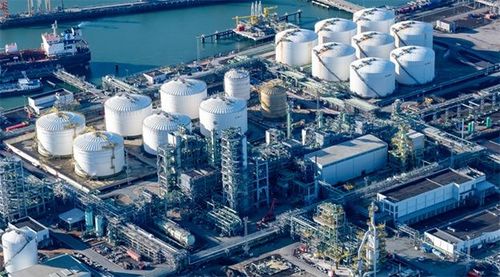Neste begins SAF production at Rotterdam biorefinery

Neste renewables refinery in Rotterdam. / SOURCE: Neste Corp.
April 9, 2025
BY Neste Corp.
Neste, the world’s leading producer of sustainable aviation fuel (SAF), has started producing SAF at its renewable products refinery in Rotterdam, the Netherlands. The refinery has been modified to enable Neste to produce up to 500,000 tons of SAF per annum. As a result, Neste’s global SAF production capability has increased to 1.5 million tons (around 1.875 billion liters) per annum.
“It is clear that we need to continue making progress in mitigating climate change and addressing aviation’s climate impact. Neste is fully committed to supporting its customers in the aviation industry to reduce their greenhouse gas emissions, and this milestone underlines that commitment. Our SAF production capability, now also in Rotterdam, enables us to significantly contribute to the implementation of the ReFuelEU Aviation Regulation and similar SAF mandates. Policies like these are crucial to ramping-up SAF production and usage, and we need to keep our ambitions and targets high. At the same time it requires support and close cooperation across the whole aviation ecosystem to accelerate the energy transition and related emission reductions,” said Heikki Malinen, President and CEO of Neste.
Neste continues investing in renewable fuels production capacity
In addition to the recent modifications to the refinery, Neste continues its strategic growth investment project in Rotterdam which will more than double the company’s production capacity at the Rotterdam refinery to 2.7 million tons of renewable products annually, making the refinery the world’s largest facility producing renewable diesel and SAF. This expansion, scheduled to be completed in 2027, will increase Neste’s total global annual renewable fuels production capacity to 6.8 million tons with Neste’s total annual SAF production capability accounting for 2.2 million tons. In addition to the Rotterdam refinery, Neste has SAF production capabilities at its refineries in Singapore and Porvoo, Finland.
Advertisement
Advertisement
Related Stories
Marathon Petroleum Corp. on Aug. 5 released second quarter financial results, reporting improved EBITDA for its renewable diesel segment. The company primarily attributed the improvement to increased utilization and higher margins.
Chevron Corp. on Aug. 1 confirmed the company started production at the Geismar renewable diesel plant in Louisiana during the second quarter after completing work to expand plant capacity from 7,000 to 22,000 barrels per day.
California’s new specified source feedstock attestation requirement: A critical new compliance step for renewable fuel producers
As of July 2025, California’s SCFS requires renewable fuel producers using specified source feedstocks to secure attestation letters reaching back to the point of origin. This marks a significant shift in compliance expectations.
The public comment period on the U.S. EPA’s proposed rule to set 2026 and 2027 RFS RVOs and revise RFS regulations closed Aug. 8. Biofuel groups have largely expressed support for the proposal but also outlined several ways to improve the rulemaking.
In celebration of World Biodiesel Day, MOL Group on Aug. 8 announced SAF was successfully produced for the first time at INA’s Rijeka Refinery during a pilot project to process biocomponent. Renewable diesel was also produced.
Upcoming Events










